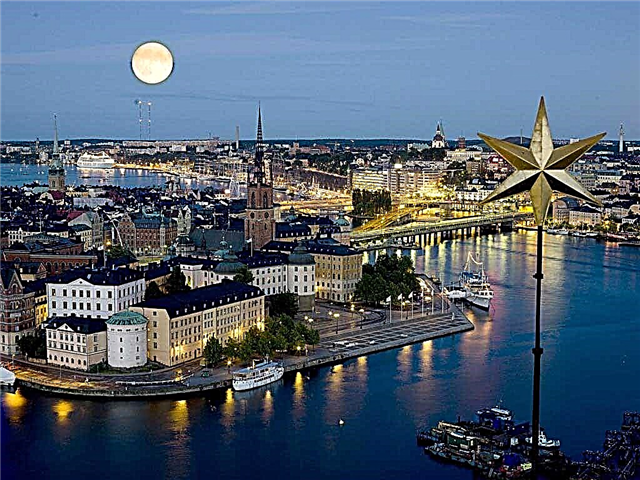Germany is located in the western part of Europe, so its climate is considered continental. Winter and summer are warm and dry here, and autumn and spring are characterized by a large amount of rainfall, which immediately determines the high and low seasons. Due to the fact that the country occupies a fairly large area, the weather and climate in Germany vary from month to month depending on the movement of air masses from the continent and the proximity to the Alps.

Country climate
The climate of the country is determined by the air masses located on its territory - northern and southern. The northern ones invariably bring cold snap and high humidity, the southern ones give dryness and warmth to the winter and summer seasons.
In northern Germany, a temperate maritime climate reigns, since there are practically no forests left here, and neither warm nor cold air masses on the plains linger for a long time. The average annual temperature is +12 ° С: winter - +1 ° С, summer - +22 ° С.
The Baltic and North Seas create the necessary conditions for a pronounced continental climate further south. Air masses move from them to the Alps every autumn and spring, and this leads to increased rainfall and lower temperatures.
The nature of the weather is changeable in any season: sunny days are suddenly replaced by heavy rains and cold snaps. Drought, heat, frost, storms are rare.
Climatic zones of the country
Germany has two climatic zones: maritime and continental. The line of their separation runs through the cities of Aachen-Bonn-Göttingen-Jön-Dresden. This is the zero isotherm, from which winter temperatures decrease to the north and rise to the south.
The maritime climate prevails in Hanover, Berlin, Bremen, Osnabrück, Hamburg, Dusseldorf. A moderate continental climate is observed in the vicinity of Dortmund, Magdeburg, Leipzig, Cottbus. Cool and dry continental climate is typical for Munich, Stuttgart, Nuremberg, Frankfurt, Karlsruhe, Baden, Kassel.
Each climatic zone has its own characteristics. The sea area is characterized by average temperatures in summer and high humidity in winter. Here the wind blows at a speed of up to 25 m / s, and precipitation is rare.
The situation is different with the continental climatic zone: the humidity is quite low here, and the air temperature in winter drops to -20 ° C below zero. In summer, the temperature rises from the coast inland, so severe winters give way to hot summers.
Spring weather
In March, the number of sunny days is at least eleven, the daytime temperature is kept within +10 ° С, and the nighttime temperature drops to about +1 ° С. The average daily humidity ranges from 60 to 70%, so even in sunny weather it is quite chilly outside.
With the onset of April, the humidity rises by 10-15%, and the rains stop. Stable sunny weather is established (up to 13 sunny days), high temperature (up to +13 degrees). The amount of precipitation in these months reaches 40 mm.
May is the beginning of the tourist season in Germany. Humidity drops to 50%, the number of sunny days increases to 16. Precipitation does not exceed 55 mm, the average daytime temperature rarely exceeds +20 ° C, and the nighttime temperature does not drop below +13 ° C.
The southern regions of Germany experience sharp changes in weather and day / night temperatures in the spring. In the northern regions it gets warmer 2-3 weeks later. During this period, the capital of Bavaria - Munich is especially good.
Summer weather

German June opens the high tourist season in the country, the average daytime temperature during this period is +20 ° С, the nighttime temperature does not drop below +15 ° С. Precipitation is abundant (up to 64 mm), but rare, the number of sunny days reaches 17.
July is the height of the summer heat and an abundant tourist flow. The average temperature is + 25 ° С, but daytime temperatures often reach + 30 ° С. Precipitation becomes much less - 45 mm.
August is the rainiest summer month (75 mm). The average temperature during this period is kept at the level of +26 ° С, temperature extremes go away. According to the forecast, stable heat at this time should spread throughout the country.
Summer is the most favorable time for sightseeing, visiting various festivals and bus tours in Germany.
In the southern regions, it gets hot at the end of summer, the humidity rises rapidly, so during this period it is better to explore the Alpine area. In the mountainous northern part of the country, precipitation is not uncommon, but it is random and only reduces the high summer temperatures.
Autumn weather
September traditionally refers to the velvet season in all regions of Germany. Warm and mild weather is established: the temperature is kept within +20 ° С, at night it can get colder by about 2-3 ° С. The amount of precipitation drops to 45 mm, and there are still many sunny days.
In October, the temperature drops to + 18 ° С during the day and up to + 12 ° С at night. There are fewer tourists, as the number of rainy days increases - 17 per month, and on the contrary, precipitation becomes less - 34 mm.
November in Germany is damp and cold, there are often sharp temperature drops from +14 ° С during the day to 0 ° С at night. The amount of precipitation and rainy days is increasing - 47 mm and 21 days, respectively. There are very few tourists in Germany during this period, as it becomes uncomfortable to walk.
The world famous Oktoberfest is held in early autumn, as the best weather is in the southern regions. Low humidity, warm nights and days create a comfortable environment for relaxation.
Autumn is recommended to be spent in the territory, which is located closer to the north of the country, since the mountain ranges stop the through winds and rain masses.
Winter weather
December is the most unsuitable month for a visit in winter, as it brings snow, strong winds and significant temperature fluctuations from +8 to -7 ° С. The amount of precipitation, which is mainly represented by snow, is at the level of 51 mm.
In January, the average temperature is within + 1 ... -3 ° С, and the weather is changeable. Precipitation is also not uncommon (up to 42 mm).
In February, the winter becomes somewhat milder, there is less precipitation (up to 34 mm), but night frosts down to -15 ° C and sharp winds in the daytime are possible.
The winter months are not suitable for sightseeing in the southern regions, but in the northern part of Germany during this period the ski season begins. Tourists from all over the world flock to alpine villages for the New Year at the end of December. The high season lasts until the first major warming in early March.
The flat coastline with high humidity and piercing winds has its own characteristics. It suffers from a lack of sunshine, while in the continental part of the country there are at least 12 sunny days per month.
When is the best time to go to Germany

The high tourist season in Germany happens twice a year. It lasts from May to September inclusive, and then starts in early December and lasts until early March.
The first season is of interest to those who plan to see the city's sights, take a bus or car tour, or attend a local beer tasting.
The winter season is chosen by tourists who want to spend holidays at a ski resort (for example, Garmisch) or spend the New Year, and with it Catholic Christmas in the heart of Europe.
The most devastating natural disasters in Germany
Natural disasters rarely disturb the inhabitants of Germany, but sometimes natural disasters do occur in this calm land.
Hurricane Kirill, which passed over Bavaria in 2007, was recognized as the most destructive cataclysm.The total damage he caused to the country's infrastructure and local residents amounted to more than 2 billion euros.
The second place was shared by the 2021 summer storms “Andreas” and “Hochwasser”, the losses from which are estimated at 1.6 billion euros.
In third place are powerful cyclones Elvira, Gisela and Frederica, which raged in May-June 2021. The damage from them amounted to approximately 800 million euros.
Equally powerful was Hurricane Lothar, which hit the northern regions in December 1999.
Conclusion
Moderate climatic conditions (cool summers, mild winters) create favorable conditions for the development of Germany's tourism potential. The high season in this country lasts more than half of the year, and the variety of natural landscapes and historical monuments provide all the opportunities for interesting leisure.
Get to know the climate and monthly weather conditions in Germany in advance, so that your stay in this country will leave only pleasant impressions.











